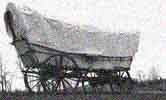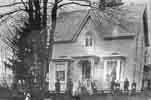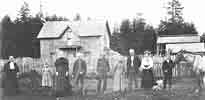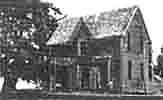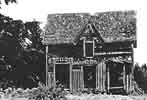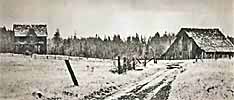|
Early Pioneerís
Faith Finally Rewarded
Excerpts from an
article in The Olympian, April 19,
1964
By William J Betts
The man
was different.Although one of the
wagon trains that crossed the hot
dusty trail in 1844 was much like
those that followed, it included a man
who was different from the pioneers he
accompanied. Like the others he
enjoyed the adventure of moving out to
the Oregon country, but the journey
meant more than this. The personal
stakes were greater freedom,
acceptances and self-esteem. The tired
immigrants, walking alongside the
wagons, choked by billowing dust
clouds, were cheered by him, their
spirits lifted. As the oppressive heat
rose in shimmering waves from the
sun-baked prairie, they looked to him
for renewed hope and comfort. He
laughed with their children.
When they
broke out in song, the big handsome
man led them in his rich baritone. Who
was this man who had such power to
change utter dejection into buoyant
good cheer? His name was George W.
Bush and he was a free black, one of
the first of his race to travel the
long trail west in an immigrant train.
He was taking his family on a mission
of hope, to a new life far from the
smoldering pot of hate and prejudice
set aboil by the slavery question.
George W.
Bush was born in the state of
Pennsylvania. His parents had been
slaves in the household of a Mr.
Stevenson, a wealthy merchant and ship
owner. Mr. Stevenson, as kind as he
was rich, gave the Bushes their
freedom and left them his wealth.
George Bush inherited his parentsí
fortune, making him not only a free
black, but a very wealthy one as well.
He was able to indulge himself as he
pleased.But for all of his great
wealth, there was one thing denied
him, to be accepted for himself, as a
man, regardless of race, regardless of
money.
He began
to travel a great deal, perhaps in
search of true freedom. When the Was
of 1812 broke out he was in New
Orleans. He immediately enlisted in
the newly formed Seventh Infantry
Regiment and fought gallantly under
General Andrew Jackson. When the brief
was over, Bush was still restless and
unable to settle down. He because a
voyageur with the Hudsonís Bay
Company, traveling throughout the
Rocky Mountains and pacific Coast
area. He finally returned to
Philadelphia where he embraced the
Quaker faith, an act which had much
influence on his later life.
In 1831,
he met and married Isabella James.
They moved to Missouri where they
purchased a farm in Boone County.
Later they sold and moved to Clay
County where they continued to
prosper.The picture wasnít perfect,
however, for Missouri was a slave
state. The gentle Quaker felt the
rancor of some of his neighbors and it
hurt him deeply. In 1843 he decided to
leave Missouri for good.
The
Bushes had heard stories of the
wonderful homesteading opportunities
in the Oregon country. Some of the
Clay County families were pulling up
stakes for the West and asked George
Bush and his family to join them. The
wagon party left Clay county in the
late spring of 1844. With the Bushes
were the Michael T. Simmons, David
Kindred, James McAllister and Gabriel
Jones families as well as three single
men.Along the trail, the party joined
another group of thirty families under
the leadership of a self-appointed
"general" who immediately made Michael
Simmons his second-in-command. Since
the general preferred hunting, the
responsibility of leadership fell on
the capable shoulders of Simmons. He,
in turn, relied on the sound judgment
and knowledge of his good friend,
George Bush.
The
rutted trail, left by previous wagons,
was often marked by wooden crosses,
Indian, accidents, and cholera took a
heavy toll of westward bound pioneers.
As the wagon train moved across the
parched, alien land, the gentle black
Quaker was everywhere, lending a
helping hand to the sick, constantly
encouraging. And he often gave
financial assistance to families who
had met misfortune on the trail. The
Buses accepted their position in
Oregon under the provisional
government (which had barred all
blacks). Bush didnít mind for himself;
he could take anything they might
inflict on him but what about his
children? No, they couldnít stay Ė
they would have to return. Before
doing so, however, they went to Fort
Vancouver, headquarters for the
Pacific Coast division of the Hudsonís
Bay Company.
When Dr.
McLoughlin, the chief factor, heard
that an old time voyageur had
returned, he welcomed Bush and his
family with open arms. Dr. McLoughlin
was aware of the ban on free blacks
settling in Oregon. He was deeply
concerned, considering discrimination
un-Christian.There was one alternative
Ė to settle north of the Oregon
country. From the rich bounty of the
land, the gentle Quaker chose to help
the newcomers to Puget Sound rather
than devote all his energy to making
money off his harvest. He helped the
new families through the winter months
until they could plan and reap a
harvest for themselves.
In the
years which followed, Bush was the
United States take possession of the
great Oregon country north to the
Forty-Ninth parallel. He saw Oregon
and Washington become territories. He
saw the country grow year after year
as people streamed into the area. But
for all the changes, George Bush, as a
black, had no rights as a citizen. He
could not vote; he could not own a
clear title to his land.
At last,
in 1855, congress recognized the great
service the black pioneer had rendered
his country. In that year, at the
insistence of the Washington
Territorial legislature, a resolution
was passed to give George Bush clear
title to his beloved land. George Bush
lived out his life on the farm at
Tumwater.
Updated:
03/04/08
|

